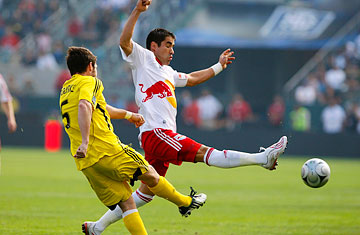
2008 MLS Cup soccer final match in Carson, California
In 1996, Major League Soccer (MLS) sank its cleats into the U.S. sports scene as an upstart 10-team league in a nation weaned on a different type of football. But MLS has steadily grown since its inception, and on March 18, the league announced it would award its 17th franchise to Vancouver, which in 2011 will become the second Canadian city to field a club. With its 14th campaign about to kick off, TIME spoke to Commissioner Don Garber about the league's growth, its goals, and its most famous player, David Beckham.
How far along is MLS in its evolutionary process?
We're way past the infant stage and we're probably through our toddler years, but we're nowhere near being a teenager in the life span of our league. This is a 14-year-old league. Other professional sports leagues are over 100 years old. I believe MLS will be around for generations to come. It might look very different than it does today. But we're still very early in the process.
What would "teenager status" look like?
A meaningful professional sports league in America. It means that we are important in the lives of our fans. Our teams resonate in their communities and have a deep connection to the local fan base. We have a presence on television for all our games. Most importantly, soccer will have become an important part of the lives of many Americans, and MLS will have been a big driver of that. (See TIME's Pictures of the Week)
When you're deciding when and where to expand, to what degree do you consider the composition of your fan base?
You want to have successful teams, whether they're in Canada, in large markets, or in small markets. At this point, what we're trying to do is build a passionate fan base. One of our most successful teams is in Toronto, and nobody really thought years ago that that would be a successful pro soccer market. It's got 16,000 season tickets on a waiting list and sells out every game. We need to go where the fans are and continue to think about how we create a geographic footprint that makes sense.
So, what does the composition of the league's fan base look like?
It's probably 30-35% Hispanic, and it's very young, an 18-25 year-old market for the most part. It's also what we call "New Americans" — people who come from countries throughout the world but also are very active both politically and from a sporting perspective.
I imagine one of the challenges of building a league from scratch is marketing the game as an attractive career destination for the very best athletes. How is MLS planning to position soccer, in this respect, against the NFL or NBA or Major League Baseball?
Today it's not at all about comparing ourselves to the other leagues. It's trying to capture a larger piece of an ever-growing soccer market in this country. There's no shortage of soccer fans in America. We need fans that watch the English Premier League or follow teams from Mexico and Argentina to be fans of their local MLS club too. (Listen to Dick Vitale Name His Top 10 NCAA Tournament Moments)
The league has successfully groomed a number of homegrown stars who have jumped ship to Europe when their careers took off. When will the league reach the point at which players view it not as a stepping stone, but as a place to play for the duration of their careers?
I think when we reach that point, we'll have established ourselves as the major league that we hope it will one day be—that is, competitive with other major soccer leagues around the world. We reach that point when we have the economic foundation, when we have the fan base, and we have further evolution of the American consumer. That's our goal: to be the destination point not just for soccer fans in this country, but for [U.S.] soccer players. We've not yet fully achieved that.
Do you consider it a backhanded compliment when top players get poached?
That dynamic exists around the world. Cristiano Ronaldo was snatched by Manchester United from Portugal, and now you have Spanish teams chasing after him. I don't know if that dynamic will ever change. The question you asked — at what point will every American player want to play in this country — well, many do today. Some of them want to go overseas, and many come back.
Can you characterize the importance of the David Beckham signing and how much his courtship with A.C. Milan has detracted from the prestige it afforded your league?
David Beckham's signing was one of the key moments in the history of MLS. His presence provided an awareness of and recognition for our league, both in this country and throughout the world. We made the decision to loan him to Milan because we believed it would help him stay in shape and achieve his personal goals with the English national team. He earned that right based on his commitment to us, and I would make that decision again if I were faced with it today.
Clearly he fell in love with his success over there and was hoping to stay. But he had a contract, and we were committed to having him fulfill that contract. And I believe he was committed to finding a way to reach a resolution that makes sense for us and for him. I believe that resolution was reached. He'll be back in July. I'm hopeful that he will continue to fulfill his commitment to us, which I believe he cares very much about.
See Pictures of the Long, Sad History of Cardinals Football
Read TIME's Q & A: Tom Brokaw's New Global Warming Documentary
